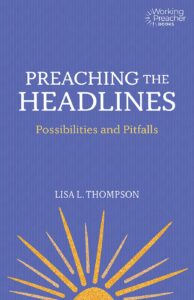Preaching The Headlines
Preaching The Headlines
I didn’t learn to preach in seminary. They emphasized studying the Bible. I also learned to think about issues of worship and doctrine. But my education in preaching started with a man named C. Oliver Buus.
Unfortunately, I have no pictures of him. However, he is the one that set me on a journey to learn how to preach. He was my supervising pastor during a time I spent working with him for a summer in Tucson, AZ. After he heard me preach the first time, he said, “Everything you said was right, but after the first five minutes, nobody was listening.” He then taught me to think of the message in terms of the listener. What is going to catch and hold the attention of someone listening to me speak. I thought of him again this past week as I anticipated a series of blog posts that will examine the concept of preaching the headlines.
with him for a summer in Tucson, AZ. After he heard me preach the first time, he said, “Everything you said was right, but after the first five minutes, nobody was listening.” He then taught me to think of the message in terms of the listener. What is going to catch and hold the attention of someone listening to me speak. I thought of him again this past week as I anticipated a series of blog posts that will examine the concept of preaching the headlines.
The basic question that I want to explore with you is simply this: to what extent should pastors preach about what is going on day-to-day in the news of the day? One pastor that I had during my teen years refused to mention anything contemporary in his preaching. His rationale was that he was concerned with the infinite, not the finite. That’s one way to look at it.
In the past decade we’ve seen many with an opposite view. Consider the rise of Christian nationalism here in the United States. The idea of many preachers during this time is to “expose” what is going on in the world.
So, which is right? Is there a middle ground? Let’s consider that together as we consider the question about preaching the headlines.
The Pandemic and Preaching The Headlines

Version 1.0.0
A helpful resource that I will be consulting is the book with the title, Preaching the Headlines, by Lisa L. Thompson. Lisa has taught preaching to various faith groups, and was driven to look at this issue partly because of the covid pandemic. This is how she puts her goal in researching and writing about this subject this way:
So what lies ahead is a framework for discernment and pragmatic decision-making. The framework assumes an awareness of our ethical responsibility as people of faith; it assumes that the scenarios will change but our obligations never do. The next go-around will not be a pandemic; it will be something else. Both today and tomorrow have their own challenges. There are no easy, certain, or euro-proof routes in this work. Life is not static, so formulas will not do. (p. 7)
Holding Both
I don’t know where I heard the presentation, but I remember listening to a man talking about how to preach in tough times. He said, and I paraphrase, that we should preach with the Bible in one hand and a newspaper in the other. His idea was that we have a responsibility to be involved preaching the headlines. We have the means to understand and interpret the present and the future.
Conclusion
Join me as I wrestle with some of these concepts in the posts ahead. And I invite you to wrestle as well with the simple question of how much you will be involved preaching the headlines in your church or gathering.



